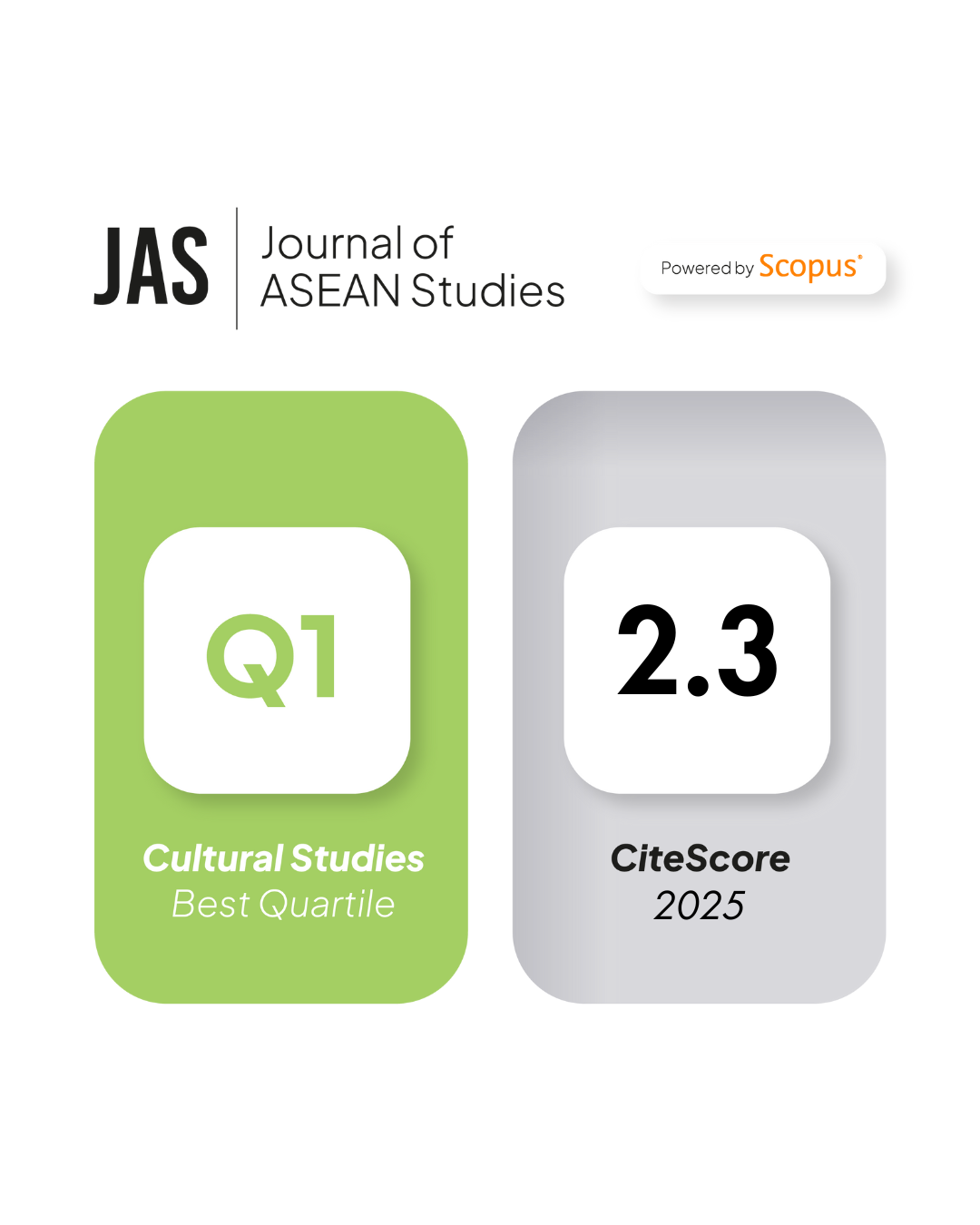Western Centric Research Methods?
Exposing International Practices
DOI:
https://doi.org/10.21512/jas.v9i1.7380Keywords:
Research Methods, Institutions, ASEAN, Practices, DecolonisingAbstract
Data curated by humans reflects the biases and imperfections of humans (O’Neil, 2017; 2016). For example, in autonomous weapons systems, the initial data entered produces algorithms from which weapons systems learn, and, as a result, the systems mirror and amplify existing biases in the data sets (O’Neil, 2017). In political science and international relations, biases are also both inherent and amplified through the research approaches and methods adopted. They, too, are frequently hidden. A stark example of this is in the debate between area and disciplinary studies. Although there is a growing recognition that area studies can make valuable contributions to the study of international relations and that there is a need to ‘decolonise’ the discipline (Suzuki, 2021), the debate so far has not recognized the gulf of differences in research methods between these two approaches. This article argues that in the study of international relations and particularly regarding institutions, area studies approaches should be more frequently adopted. The limited use of these approaches not only hampers new research but also hides a colonial hangover.
References
Acharya, Amitav. 2011. ‘Dialogue and Discovery: In Search of International Relations Theories Beyond the West’ Millennium, 39(3), pp.619-637.
Adler, Emmanuel, and Victor Pouliot (eds). 2011. International Practices, Cambridge University Press: Cambridge, UK
Adler-Nissen, Rebecca, and Vincent Pouliot. 2014. ‘Power in Practice: Negotiating the International Intervention in Libya’ European Journal of International Relations, 20(4), pp.889-911
ASEAN, 1967. The Bangkok Declaration, signed 8th August, 1967, available online http://asean.org/the-asean-declaration-bangkok-declaration-bangkok-8-august-1967/ last accessed 1st May 2018.
ASEAN, 2002. Declaration on the Code of Conduct for Parties in the South China Sea, online http://asean.org/?static_post=declaration-on-the-conduct-of-parties-in-the-south-china-sea last accessed 1st May 2018.
Barnett, Michael and Martha Finnemore. 2004. Rules for the World: International Organizations in Global Politics, Cornell University Press: Ithaca, USA.
Bates, Robert H., 1997. ‘Area Studies and the discipline: a useful controversy?’, Political Science and Politics, 30(2), pp. 166-169.
Breslin, Shaun, 2002. IR, Area Studies and IPE: Rethinking the Study of China’s International Relations, CSGR Working Paper, no. 94/02.
Bueger, Chirstian. 2014. ‘Pathways to practice: praxiography and international politics’ European Political Science Review, 6(3), pp.383-406.
Bueger, Christian, and Frank Gadinger. 2015. ‘The Play of International Practice’ International Studies Quarterly, 59, pp.449-460.
Collins, A. ‘Forming a Security Community: lessons from ASEAN’, International Relations of the Asia-Pacific, (2007) 7(2) pp.203-225.
Foot, Rosemary, and Evelyn Goh. 2018. ‘International Relations of East Asia: A new research prospectus’ International Studies Review, online first, pp.1-26.
Fukuyama, Francis 2004. ‘How academia failed the Nation: the decline of regional studies’, http://www.campus-watch.org/article/id/1507 last accessed 24 May, 2021.
Goh, Evelyn. 2004. ‘The ASEAN Regional Forum in United States East Asian strategy’, The Pacific Review, 17(1), pp. 47-69.
Haacke, Jurgen. 2003. ASEAN’s Diplomatic and Security Culture: Origins, Development and Prospects, London, Routledge, pp. 16-51.
Haacke, Jürgen. 2009. The ASEAN Regional Forum: from dialogue to practical security cooperation? Cambridge Review of International Affairs, 22 (3). pp. 427-449.
Halperin, Sandra and Oliver Heath, 2017 Political Research: Methods and Practical Skills, Oxford University Press: Oxford.
Harvey, William S. 2011. ‘Strategies for Conducting Elite Interviews’ Qualitative Research, 11, pp.432-441.
Hollis, Martin. 2008. The philosophy of social science: an introduction, Cambridge University Press: Cambridge, UK
Johnson, Chalmers and Hidenori Ijiri, 2005. ‘About Area Studies and Japan: a dialogue between Chalmers Johnson and Hidenori Ijiri’, Japan Policy Research Institute, Occasional Paper no. 34.
Jones, Catherine. 2015. ‘Great powers, ASEAN, and security: reasons for optimism’ The Pacific Review, 28(2), pp.259-280.
Katsumata, Hiro. 2010. ASEAN's Cooperative Security Enterprise: Norms and Interests in the ASEAN Regional Forum, London, Routledge.
Katzenstein, Peter, 2001. ‘Area and regional studies in the United States’, PS: Political Science and Politics, 34(4), pp.789-791.
Kuhn, Thomas. 1991. (3rd Edn.) The Structure of Scientific Revolutions, Chicago University press: Chicago.
Kuhonta, Erik Martinez, Dan Slater, and Tuong Vu (eds.) 2008. Southeast Asia in Political Science: Theory, Region and Qualitative Analysis, Stanford University Press: Stanford, California.
Lambert, Richard D. 1990. Blurring the Disciplinary Boundaries: "Area Studies in the United States"
The American Behavioral Scientist; 33(6) pp.712-732.
Louis, Renee Pualani, 2007. "Can You Hear us Now? Voices from the Margin: Using Indigenous Methodologies in Geographic Research" Aboriginal Policy Research Consortium International (APRCi). Paper 175
Duncan McCargo, 2008. Tearing Apart the Land: Islam and Legitimacy in Southern Thailand, Cornell University Press.
Narine, Shaun. 1997. 'ASEAN and the ARF: The Limits of the ASEAN Way', Asian Survey, 37(10) pp. 961-76.
Navari, Cornelia. 2010. ‘The concept of practice in the English school’ European Journal of International Relations, 17(4), pp.611-630.
Neumann, Iver. 2012. At home with the diplomats: inside a European foreign ministry, Cornell University Press: Ithaca.
Null, Wesley. 2011, Curriculum: from theory to practice, Rowman and Littlefield.
O’Neil, Cathy. 2016. Weapons of Math Destruction, Crown Publishers.
O’Neil, Cathy. 2017. ‘Autonomous Weapons Systems: Understanding Bias in machine learning and Artificial Intelligence’ presentation comments at UNGA Side event, 5th October, 2017, UNHQ New York, Conference room 12.
Pouliot, Vincent. 2013. ‘Methodology: Putting practice theory into practice’ in Adler Nilsson, Rebecca (eds.) Bourdieu in International Relations: Rethinking key concepts in IR Routledge: Abingdon.
Pouliot, Vincent and Jeremie Cornut. 2015. ‘Practice Theory and the study of diplomacy: A research agenda’, Cooperation and Conflict, 50(3), pp.297-315
Pye, Lucian W., 2001. ‘Asia Studies and the Discipline’, PS: Political Science and Politics, vol. 34, no. 4, December 2001, pp. 805-807.
See Seng Tang. 2009, ‘Southeast Asia: Theory and Practice’ pp.12-133.
Smith, Linda T. 2012. Decolonising Methodologies: Research and Indigenous Peoples, 2nd Edition, Zed Books, London.
Special Issue of Millennium, 2011. 39(3).
Special issue of European Journal of International Relations, 2013, 19(3).
Stubbs, Richard. 2014. 'ASEAN's leadership in East Asian region-building: strength in weakness' The Pacific Review, 27(4)
Suzuki, Shogo. English and the Legacy of Linguistic Domination in IR. In: Capan Z.G., dos Reis F., Grasten M. (eds) The Politics of Translation in International Relations. Palgrave Studies in International Relations. Palgrave Macmillan, Cham. https://doi.org/10.1007/978-3-030-56886-3_9
Tansey, Oisín. 2007. ‘Process Tracing and Elite Interviewing: A Case for Non-Probability Sampling’ PS: Political Science and Politics 40(4) pp.765-772.
Tickner, J. Ann. 2011. ‘Dealing with Difference: Problems and Possibilities for Dialogue in International Relations’ Millennium, 39(3) pp.607-618.
UNGA. 2017. Side event, ‘Autonomous Weapons Systems: Understanding Bias in machine learning and Artificial Intelligence’ 5th October, UNHQ New York, Conference room 12.
Waever, Ole and Arlene Tickner (eds.) 2009. International Relations Scholarship Around the world, Routledge, London.
Warleigh-Lack, Alex and Luk Van Langenhove. 2010. ‘Introduction: Rethinking EU Studies: The contribution of comparative studies’ European Integration, 32(6), pp.541-562.
Downloads
Published
How to Cite
Issue
Section
License
Copyright (c) 2021 Catherine Jones

This work is licensed under a Creative Commons Attribution-NonCommercial 4.0 International License.


























